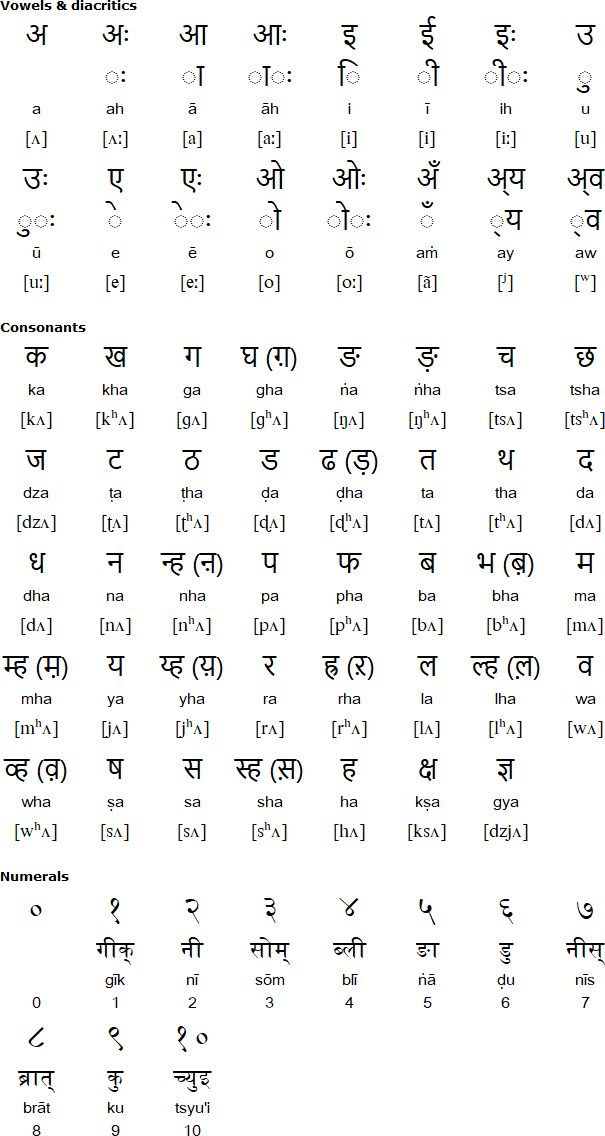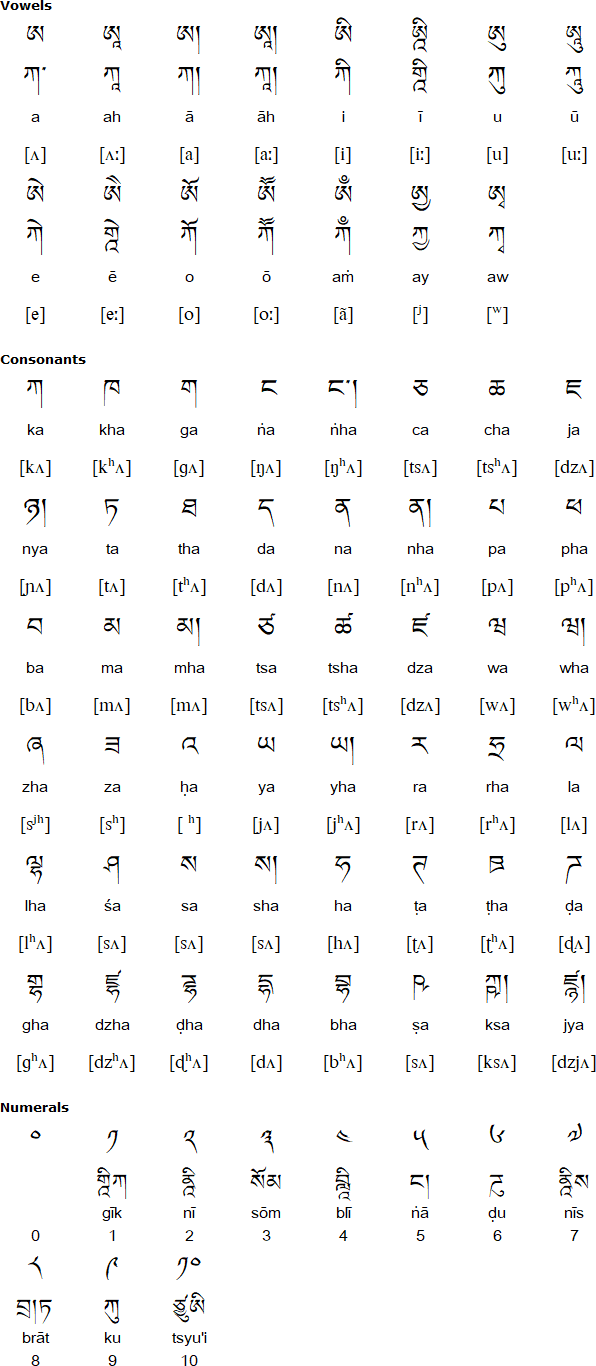Tamang is a member of the Tamangic branch of the Sino-Tibetan language family. It is spoken mainly in eastern Nepal, and also northern India and Bhutan, by about 1.3 million people. Tamang is officially recognised as an indigenous language in Nepal.
The main varieties of Tamang are:
Eastern Tamang is taught and/or used as a medium of instruction in primary schools in Nepal and Sikkim. It is also used in newspapers, literature, and on the radio and TV in Nepal.
Western Tamang and Northwestern Tamang are taught in primary schools, used in literature and newspapers, and on the radio.
Tamang is written mainly with the Devanagari alphabet, and also with the Tibetan alphabet sometimes.


Download alphabet charts for Tamang (Excel)
बेनान म्हीकादे प्रतिष्ठा थेन याङतामला आधाररी केमाहेन्सेन स्वतन्त्र थेन च्योच्यो ताला। थेनीकादे बुद्धि थेन विवेक किन्दासी खाबा ताला ओम गीसेमगीला गुङरी डीक्पा ह्रिक्पा लातोसेदा मुला।
བེན།ན་ མཱི།ཀ།དེ པྲཏིཥྛ། ཐེན་ ཡ།ངཏ།མལ། ཨ།ན།ར་རཱི ཀེམ།ཧེནྶེན་ སྭ་ཏནྟྲ ཐེན་ ཙོཙོ ཏ།ལ།. ཐེནཱིཀ།དེ བུདྣི ཐེན་ ཝིཝིཀ་ ཀིནྡ།སཱི ཁ།བ། ཏ།ལ། ཨོམ་ གཱིསེམ་གཱིལ། གུང་རཱི ཌཱིཀྤ། ཧྲིཀྤ། ལ།ཏོསེད། མུལ།.
benanʌ mʰikade prʌtisʈʰa tʰenʌ yaŋʌtamʌla adʰarʌri kemahensenʌ sʷʌtʌntrʌ tʰenʌ tsʲotsʲo tala. tʰenikade buddʰi tʰenʌ wiwekʌ kindasi kʰaba tala omʌ ɡisemɡila ɡuŋʌri ɖikpa rʰikpa latoseda mula.
All human beings are born free and equal in dignity and rights. They are endowed with reason and conscience and should act towards one another in a spirit of brotherhood.
(Article 1 of the Universal Declaration of Human Rights)
Details provided by Biswajit Mandal (biswajitmandal[dot]bm90[at]gmail[dot]com)
Information about Tamang
https://en.wikipedia.org/wiki/Tamang_(language)
https://www.ethnologue.com/language/taj
https://www.ethnologue.com/language/tdg/23
https://www.ethnologue.com/language/tge/23
https://www.academia.edu/1361754/A_Linguistic_Description_of_Tamang_Language_Spoken_in_Sikkim_State
Chhantyal, Gurung, Tamang, Thakali
Aka-Jeru, Angika, Athpare, Avestan, Awadhi, Bahing, Balti, Bantawa, Belhare, Bhili, Bhumij, Bilaspuri, Bodo, Bhojpuri, Braj, Car, Chamling, Chhantyal, Chhattisgarhi, Chambeali, Danwar, Dhatki, Dhimal, Dhundari, Digaro Mishmi, Dogri, Doteli, Gaddi, Garhwali, Gondi, Gurung, Halbi, Haryanvi, Hill Miri, Hindi, Ho, Jarawa, Jaunsari, Jirel, Jumli, Kagate, Kannauji, Kham, Kangri, Kashmiri, Khaling, Khandeshi, Kharia, Khortha, Korku, Konkani, Kullui, Kumaoni, Kurmali, Kurukh, Kusunda, Lambadi, Limbu, Lhomi, Lhowa, Magahi, Magar, Mahasu Pahari, Maithili, Maldivian, Malto, Mandeali, Marathi, Marwari, Mewari, Mundari, Nancowry. Newar, Nepali, Nimadi, Nishi, Onge, Pahari, Pali, Pangwali, Rajasthani, Rajbanshi, Rangpuri, Sadri, Sanskrit, Santali, Saraiki, Sirmauri, Sherpa, Shina, Sindhi, Sunwar, Sylheti, Tamang, Thakali, Thangmi, Wambule, Wancho, Yakkha, Yolmo
Amdo Tibetan, Balti, Bokar, Chocha Ngacha, Choni, Dzongkha (Bhutanese), Jirel, Khams Tibetan, Khengkha, Ladakhi, Sikkimese, Tibetan, Sherpa, Tamang, Tshangla
Page last modified: 31.01.24
[top]
You can support this site by Buying Me A Coffee, and if you like what you see on this page, you can use the buttons below to share it with people you know.

If you like this site and find it useful, you can support it by making a donation via PayPal or Patreon, or by contributing in other ways. Omniglot is how I make my living.
Note: all links on this site to Amazon.com, Amazon.co.uk
and Amazon.fr
are affiliate links. This means I earn a commission if you click on any of them and buy something. So by clicking on these links you can help to support this site.
[top]